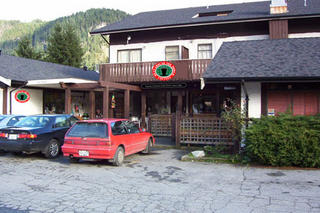(note: this is a sermon that was originally preached in February of 2004)John 13.36-14.4
John 18.12-27
John 21.15-17
No, I didn't see this one coming
It suddenly snuck up on me
I can't say you didn't tell me so
I can't say you didn't warn me
I was there when they accused you
But I guess I was too afraid
Not just once and Not just twice
But three times I denied your name
I never thought I would get even a second chance
But you've given that and so much more
And then for every time I ever did deny
You ask me if I love you, You know I do, Lord
Mac Powell
I would like to start in the middle of the first text. We read here a promise. It is important that we note this. The substance of most of today's text is one that, without this promise would be difficult to deal with. In its essence it is pointing our focus on the dark side of our hearts.
Chapter 14 verses 1 and 2 show us the loving and continuing perseverance of Christ toward his disciples. He not only tells them of the future dwelling place that he is preparing for them but also admonishes them "LET NOT YOUR HEARTS BE TROUBLED" Please keep this in mind.
At the beginning of today's passage we have a Petedumbfoundeddumfounded. Not only is the Lord telling Peter that he cannot go with him but in opposition of what Peter feels He will deny the Christ, his friend and Lord. Peter is so sure that he should be with Christ that he states that he will lay down his life for Christ's sake. This is of course in contrast or contradiction to Christ's prediction.
We of course all know this story. Peter does in fact at a latter point do exactly what the Lord said he would. Looking at this we can only assume that Peter is either stupid or blinded or a lying fool. This is a neat conclusion that requires nothing more than for us to say "Don't do what Peter did!" I would ask you is this the point? Is this the case of an incident that was important enough to include in all four of the Gospels? Of course this is not the case. I would suggest that the point is something that is far closer to our own hearts.
So what is the point?
How is it that a disciple of Christ, one the closest to him deny Him?
How is it that a disciple of Christ didn’’t recognize the mistake of his actions until too late?
How is it that he could be so stupid?
Of course this is followed by the hard question. If Peter could be so stupid as to deny Christ, wouldn’’t we all?
Please note this, the point here is: Not one is without this sin. This road to Golgotha, the road to the hill they called the Skull, this is a road that only ONE could walk. This is Christ’’s task. Although we all do, and should feel shame about our lack of being involved, it is the way it was ordained.
Why is this?
This is so that, even though Peter stated that he would lay down his life for the Lord, he couldn’’t. This is so that Chris Klassen cannot stand and say I will lay down my life for you. This is so that you cannot stand and say I will lay down my life for you. This is so that no one can stand and say I will lay down my life for you.
I have been paying attention to the media with regards to an event that is happening this Wednesday. Since the first time I heard of the movie "The Passion of the Christ" I have had much more than a passing interest in what is and has been happening around it. There is much conversation happening about its perceived anti-Semitic nature. I cannot speak of the movie as a whole, although I will say that many people I respect greatly have said that this is not an anti-Semitic rendering. I can say that I had the opportunity to view the original trailer and can only find in it a great spotlight. This spotlight is on my sin and my culpability in the death of Christ. I have a friend that is anxious to go to the theatre to see the full production. I can say that I desire to see it. I can’’t say that I desire to see it in public. I find that a brief viewing of the trailer has moved me to tears and wonder if I will be embarrassed by my reaction in a public forum. You see like Peter and like you I did not lay my life down for Christ. In a great manner without a legitimate charge, with only love, Christ lay down his life for us. This is painful and humbling. It should be.
Moving on to Peter’’s denial itself. We now see in John 18 that even having warning, that Peter still denies Christ. This is an emphatic denial. In the texts of both Matthew and Mark we are told that Peter cursed and swore that he didn’’t know Christ. Not to put too blunt a point on it but this is of profound significance. The meaning of the text here is a very strong term that involves pronouncing ones own death at the hand of God. John MacArthur Jr. states that not only do Peter’’s denials become more intense and extreme as the accusations become more specific but that the curse in essence was "May God kill and damn me if I am not speaking the truth." Now is this the voice of a disciple of Christ?
In the account of the Gospel of Luke we are told in another way of Peter’’s denial. This account also shows us that he did not have a realization of what he had done until the cock crowed and the Eyes of the Christ whom he had denied looked upon him. What was his response? What should ours be? Peter went out and wept bitterly.
How many times do we forget or deny Christ in doing things that are wrong? As humans we have the ability to divide our life into Godly things and life things. Of course underlying this as Christians we are Christians in our being, but I often wonder how it is that I can put a certain unholy action in a little compartment and feel no conviction until after the damage has been done. Why is this? It is of course, that as with Peter, the conviction comes when Holy Spirit looks upon us and brings us to recognition of our sin.
What is our response? As Peter we weep bitterly.
I am reminded of a story that an old saint once related to me. It seems that one night when he was young he went over to an older friends house. As he arrived there and as the door was opened he heard wailing and weeping. Inquiring as to what was going on, the lady of the house told him that her husband was dealing with the conviction of sin. The young man in his desire to help out and solve the problem of conscience asked to go into the back room and talk to the husband. The wise lady of the house instructed him that he would not do any such thing. The Lord is not through with him.
So now what do we do? We have denied Christ in word or in action. This is the most dire of circumstances. How painful a time. It was as we know painful for Peter and it is painful for us. This would be the end of the line save for one thing. Remember the promise that we mentioned at the beginning?
Lets now turn to John 21
I am sure that in as much as in doesn’’t escape me it wouldn’’t have Peter either. Peter had fallen from apostleship. As Calvin says "how could he, who had basely revolted from it, be capable of instructing others in the faith." So when the resurrected Christ asks Peter three times "do you love me more than these?" It would not escape Peter the pain of his denial or the blatant nature of his three denials and Christ’’s three new questions.
There is forgiveness and renewal. This is the matter of how we now shall live. After our betrayal. After our conviction. After our weeping. After our repentance. After we are forgiven and renewed and restored to a right relationship with the Christ there is responsibility. Christ lovingly gave a task to Peter. Peter needed this. We need this. This is not just about Peter tending to Christ’’s sheep. This is our collective responsibility. When Christ asks Peter to tend his lambs it should not escape us, that to us also he gives us a responsibility.
How great it is that He who loves us gives us a task that we need.
Now how does this look? As parents we are not just to present the Gospel to our children we are to feed it to them. We are to live our lives upright and holy so they may see. We are to instruct them in the way of the Lord, showing them and admonishing them to understand. We are to PRAY for their understanding.
As teachers we are to challenge our students. We are to challenge them in both action and in correct thinking. Godly thinking. All things as to Christ. Preparing them for trials and questions that come in and out of season.
As fellow Christians we are to sharpen one another in love. As "Iron sharpens iron, so one man sharpens another. We promote growth in thought and action. Stimulating intellect as we increase our activity toward another and toward the world.
We started today with the words from a song of Mac Powell’’s It ends like this.
Lord, you took the pain even though I left You
And you took the shame and You made it all your own
Why’’d You take the blame for everything that I’’ve done?
Lord, You took the pain
You and You alone, You and You alone
This is a lesson that we all must learn. We are also best to keep it close to our hearts. I am sure that Saint Peter did. I would like you to open your Bibles to the text of second Peter 3.17-18. In the last words of Peter’’s epistles, as he is fighting to keep people from looking to teachers who are twisting Paul’’s teachings.
Peter 3. 17-18
You therefore, beloved, since you know this beforehand, beware lest you also fall from your own steadfastness, being led away with the error of the wicked; but grow in the grace and knowledge of our Lord and Savior Jesus Christ. To him be the glory both now and forever. Amen.
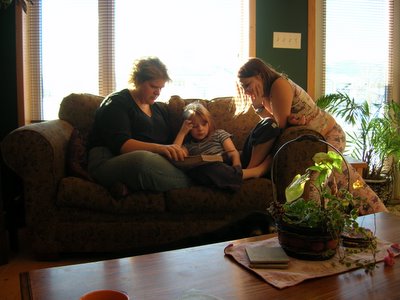
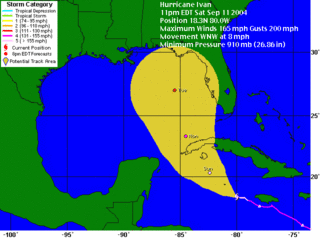
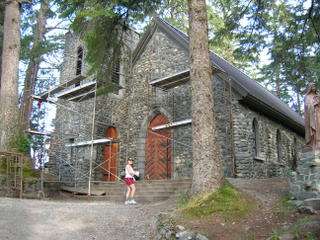










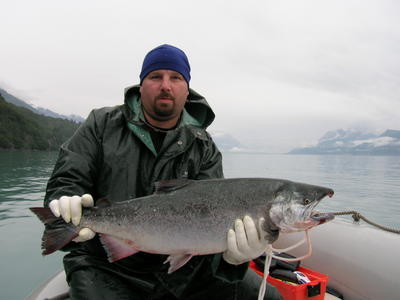


 I find it ever amazing how beautiful, what would otherwise be compost, can become in the right hands. Now all that is left to do is eat Turkey.
I find it ever amazing how beautiful, what would otherwise be compost, can become in the right hands. Now all that is left to do is eat Turkey.

